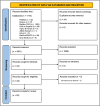Exploring social determinants and hepatocellular carcinoma: a scoping review of evidence and implications
- PMID: 39712416
- PMCID: PMC11657139
- DOI: 10.1080/08998280.2024.2406030
Exploring social determinants and hepatocellular carcinoma: a scoping review of evidence and implications
Abstract
Background: Hepatocellular carcinoma (HCC) is a leading cause of cancer-related deaths worldwide. Social determinants of health (SDH) significantly impact HCC outcomes, yet comprehensive insights into these effects are lacking. This scoping review aimed to examine the influence of SDH on HCC outcomes.
Methods: Following PRISMA-ScR guidelines, we searched 10 databases, including PubMed and Scopus, using terms related to HCC and SDH. We included studies published between 1994 and 2024, focusing on human participants and various study designs. A total of 20 studies were selected, including cross-sectional, cohort, and case-control studies.
Results: The review identified disparities in HCC outcomes linked to socioeconomic status, health care access, and racial and ethnic differences. Patients in disadvantaged socioeconomic conditions and marginalized racial groups faced delays in treatment and worse outcomes. United States-based studies highlighted pronounced disparities compared to studies in Argentina, France, and Australia. Various SDH metrics provided inconsistent results, illustrating a need for standardized measures.
Conclusions: SDH significantly shapes HCC outcomes, revealing gaps in current research. Future studies should integrate various SDH factors using consistent metrics to improve HCC care and reduce health disparities.
Keywords: Hepatocellular carcinoma; hepatology; oncology; public health; social determinants of health.
Copyright © 2024 Baylor University Medical Center.
Conflict of interest statement
The authors report no funding or conflicts of interest.
Figures
Similar articles
-
Health inequalities in hepatocellular carcinoma surveillance, diagnosis, treatment, and survival in the United Kingdom: a scoping review.BJC Rep. 2025 Mar 3;3(1):13. doi: 10.1038/s44276-025-00126-5. BJC Rep. 2025. PMID: 40033086 Free PMC article.
-
Beyond the black stump: rapid reviews of health research issues affecting regional, rural and remote Australia.Med J Aust. 2020 Dec;213 Suppl 11:S3-S32.e1. doi: 10.5694/mja2.50881. Med J Aust. 2020. PMID: 33314144
-
Racial and Ethnic Disparities in Survival Among Patients With Hepatocellular Carcinoma in the United States: A Systematic Review and Meta-Analysis.Clin Gastroenterol Hepatol. 2022 Feb;20(2):e267-e288. doi: 10.1016/j.cgh.2020.12.029. Epub 2020 Dec 30. Clin Gastroenterol Hepatol. 2022. PMID: 33387668 Free PMC article.
-
Identifying the barriers and facilitators to culturally responsive HIV and PrEP screening for racial, ethnic, sexual, and gender minoritized patients: A scoping review protocol.PLoS One. 2023 May 24;18(5):e0281173. doi: 10.1371/journal.pone.0281173. eCollection 2023. PLoS One. 2023. PMID: 37224118 Free PMC article.
-
Scoping review: national monitoring frameworks for social determinants of health and health equity.Glob Health Action. 2016 Feb 5;9:28831. doi: 10.3402/gha.v9.28831. eCollection 2016. Glob Health Action. 2016. PMID: 26853896 Free PMC article.
Cited by
-
Geographic diversity of human liver cancers mirrors global social inequalities.Front Oncol. 2025 May 16;15:1565692. doi: 10.3389/fonc.2025.1565692. eCollection 2025. Front Oncol. 2025. PMID: 40452835 Free PMC article. Review.
References
-
- Agarwal PD. The prevalence of psychosocial barriers and their impact on receipt of HCC care in US veterans: role of tumor board model of care citation. Jpn J Gastroenterol Hepatol. 2007;6(19):1–5.
Publication types
LinkOut - more resources
Full Text Sources


